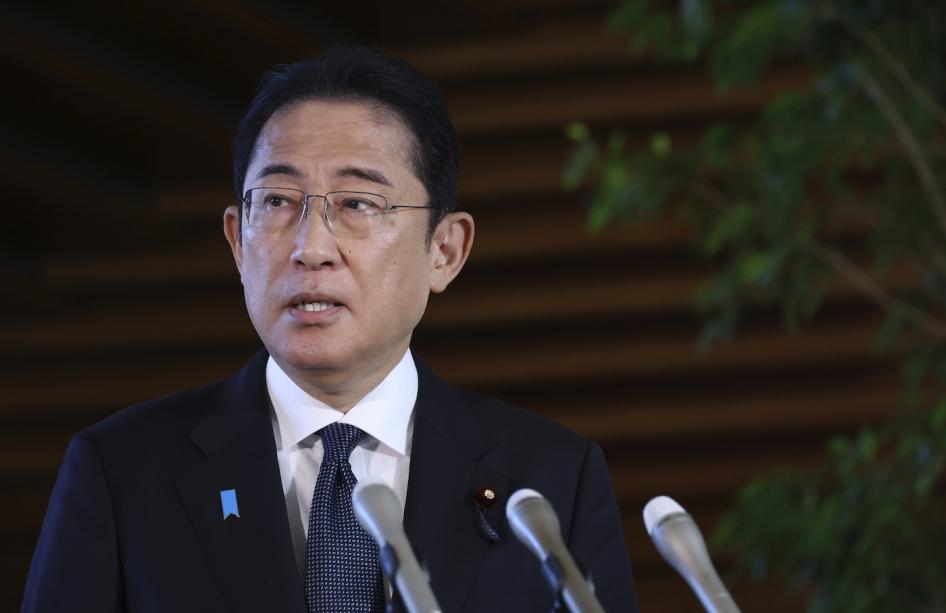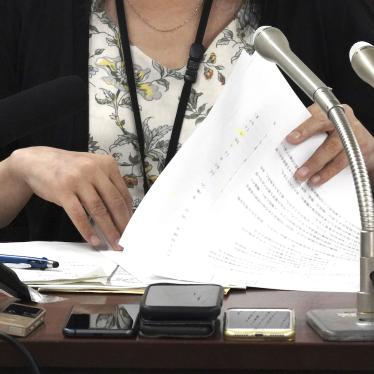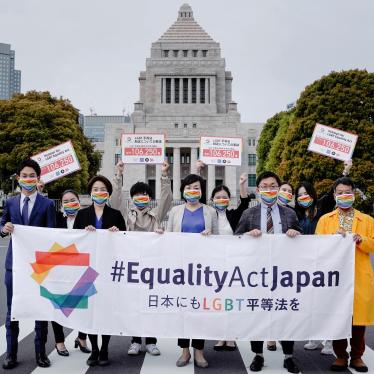Prime Minister Fumio Kishida is traveling in coming days to two major international summits: the Association of Southeast Asian Nations (ASEAN) on September 6-7 in Jakarta, and the Group of 20 (G20) on September 9-10 in India.
Both visits come at a time of heightened international disunity. The G20 host, India, is navigating severe diplomatic fallouts between members over the war in Ukraine and is struggling to forge meaningful areas for consensus. The G20 may end without a common statement on any issue.
Meanwhile, ASEAN’s current chair, Indonesia, is struggling to maintain the bloc’s cohesion in the face of rising tensions between China and several ASEAN members, and the human rights crisis in Myanmar.
The failure of ASEAN and the G20 to reach substantive agreements would have critical consequences for human rights. These summits are meant to focus on the welfare of billions of people. Prime Minister Kishida has strengthened Japan’s longstanding official commitment to human rights diplomacy. Prime Minister Kishida should act with urgency in Jakarta and Delhi to seek consensus and remind other leaders that many proposed summit topics—debt crises, social protection programs, food security, internet freedom—are at their root about human rights, and that whatever political differences exist, these are issues that the assembled governments can and should agree on.
Most ASEAN and G20 members can and should support stronger measures against Myanmar’s military junta, whose widespread abuses against its population have been well-documented. ASEAN members Indonesia, Malaysia, and Singapore have called for more pressure on the junta. Even the junta’s past defenders, Russia and China allowed a United Nations Security Council resolution on the crisis last December. Japan—a current Security Council member—should voice support for stronger action on Myanmar at the UN and enlist support from G20 members.
Another area for which there should be agreement is Afghanistan, where the Taliban’s severe restrictions on women’s rights have been criticized by the UN Security Council, and widely condemned by governments the world over, even Saudi Arabia, Iran, and the rest of the 57-nation Organisation of Islamic Cooperation (OIC). This is rare unanimity in today’s polarized world, and any hopes of the Taliban reversing course depend on it being maintained.
The Japanese government should act as a bridge in discussions among otherwise divided governments on these and other international human rights crises.
As a key actor on the global economic stage, Japan should also strive with other governments to reach consensus on the world’s sovereign debt crisis, which is creating political instability and human suffering in multiple continents. As of a few months ago, 39 low-income countries were in or near debt distress, according to the International Monetary Fund (IMF). The IMF is currently imposing austerity measures on many of these countries as a condition of support—despite a well-documented history that these policies exacerbating poverty and inequality and undercutting rights. Japan and other G20 governments, as key stakeholders at the IMF, should affirm their support for universal social protection systems, and not means-tested systems that base eligibility for support on income, wealth, or other narrow indicators of poverty and that often leave out many people who need the help most. Universal programs have been shown to be most effective at reducing poverty and inequality, promoting social cohesion and solidarity, and improving economic resilience. Means-tested systems often end up excluding key populations in need.
Most important, Prime Minister Kishida should publicly embrace Japan’s role as a democratic government and work with other elected leaders attending the summits to protect and promote rights-respecting democratic rule.
Human Rights Watch reporting focuses not only in autocratic countries like China and Russia but also Japan, India, the US, and other G20 democracies. We have repeatedly called on these governments to better address gender discrimination, racism, and other entrenched barriers to equality. Kishida will need to acknowledge that democratic institutions are flawed and increasingly under threat. But Prime Minister Kishida should still speak jointly with other democratic leaders at ASEAN and the G20 to reaffirm the underlying aims of democratic systems: to promote and protect human rights and liberties.
In doing so, Kishida will need to publicly raise human rights issues with the hosts, Indonesia and India, both of which have human rights records that have markedly worsened.
In Indonesia, national and local laws are increasingly restricting women’s rights and the rights of LGBT people and religious and ethnic minorities, among other issues. Prime Minister Kishida should raise concerns about these trends and note that they not only threaten democratic norms but will imperil foreign investment.
In India, civil and political rights have markedly deteriorated under the Hindu nationalist Bharatiya Janata Party-led government, especially for groups facing persecution due to their caste, religion, ethnicity, or political belief, and for civil society advocates, journalists, and human rights defenders critical of the government. In meetings with Indian Prime Minister Narendra Modi, Prime Minister Kishida should directly raise concerns and publicly urge him to condemn communal violence, particularly targeting Muslim, Christian and other religious minorities. Kishida should also urge Modi to end the government’s crackdown on civil society groups, human rights activists, and critics, and stop the pervasive use of overbroad and indiscriminate internet shutdowns.
Democratic governments cannot speak effectively on human rights issues unless they honestly speak about their own problems, and Prime Minister Kishida should publicly say so, and encourage other democratic leaders to join him.









